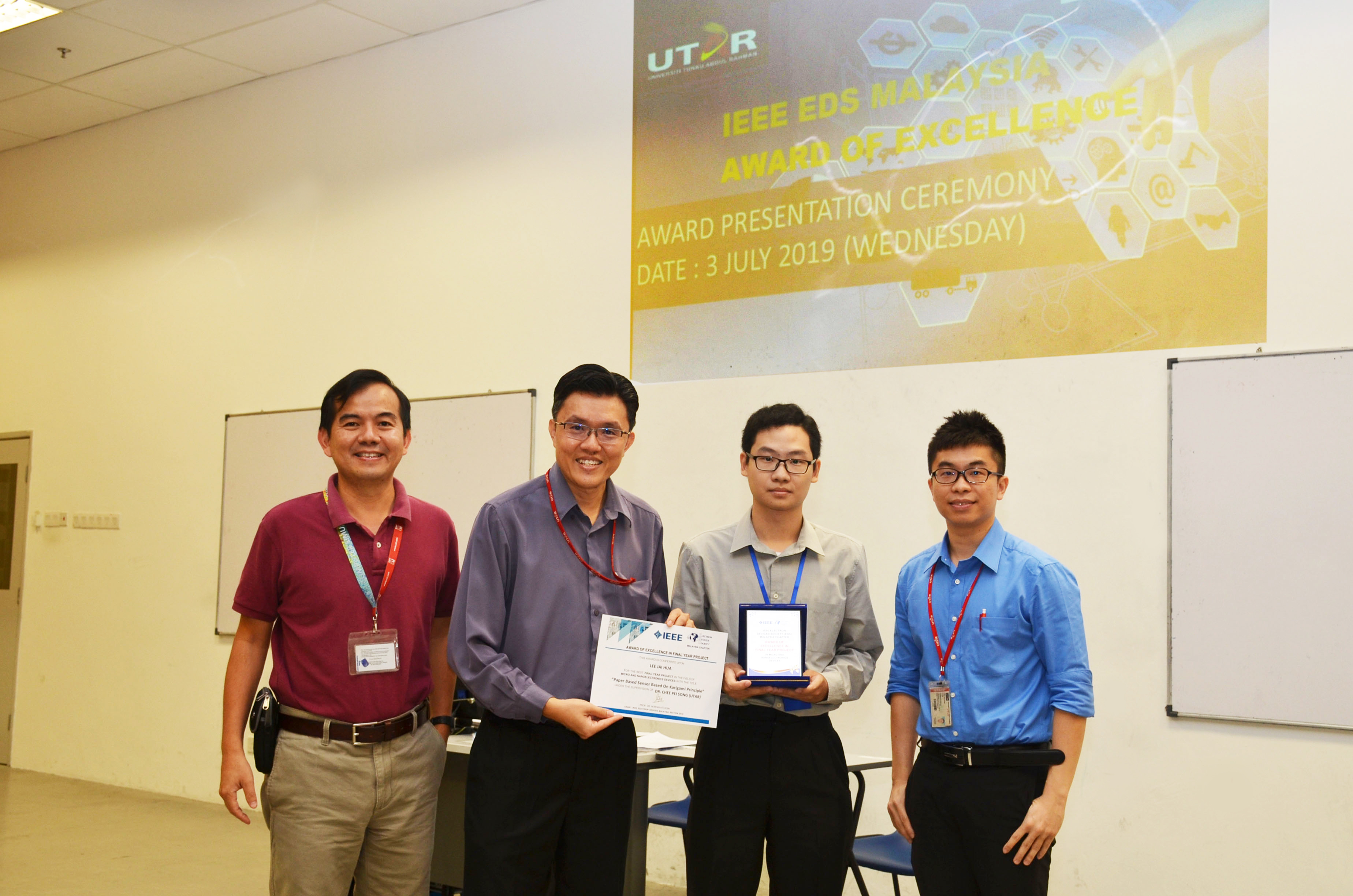


From left: Prof Lim, Prof Goi, Lee and Dr Chee
Master of Engineering Science student Lee Jai Hua was overjoyed when he was awarded the Institute of Electrical and Electronics Engineers (IEEE) Electron Devices Society (EDS) Malaysia Award of Excellence by IEEE EDS Malaysia Chapter for the best Final Year Project (FYP) in Micro and Nanoelectronics Devices.
Present to share his happiness at the award ceremony, held on 3 July 2019 at UTAR Sungai Long Campus were Lee Kong Chian Faculty of Engineering and Science Dean Prof Ir Dr Goi Bok Min, Centre for Communication Systems and Networks Chairperson Prof Ts Dr Lim Eng Hock, Lee’s supervisor Dr Chee Pei Song, staff and students. Along with a plaque presented by Prof Goi, Lee also received a certificate with IEEE and EDS logos.
“I am very happy, and at the same time, grateful to my supervisor, Dr Chee, for his guidance that had helped and prepared me for the competition. I am also thankful to my parents and friends for their never-ending support,” enthused Lee.
He added, “Apart from my passion towards my FYP, I believe my win is also a result of the knowledge and training that I gained from study years as a Bachelor of Engineering (Hons) Electrical and Electronic Engineering student. The classes were an important foundation for my research, and the practical sessions had helped me become more independent in researching. Applying the things I have learnt enabled me to complete my project efficiently, and I also obtained good data and results.”
Meanwhile, Dr Chee complimented Lee for his hard work and enthusiasm towards his research and mentioned that Lee’s research also won third place at the faculty’s FYP competition.
Themed ‘Micro and Nanoelectronics Devices Project’, the competition aimed to encourage more researching in areas related to Very Large Scale Integration (VLSI), Microelectromechanical Systems (MEMS) and Nanoelectromechanical Systems (NEMS). The competition also acknowledges students researching in these areas and promotes excellence in the fields of electron devices for the benefit of humanity.
The winning FYP is titled “Paper Based Sensor on Kirigami Principle”. The research uses ionic polymer-metal composite (IPMC) as a sensor. IPMC can act as a sensor as well as an actuator. It bends when a voltage is applied to it and when it acts as an actuator. As a sensor, it generates an electrical voltage under mechanical deformation. IPMC’s practical application includes harvesting energy from mechanical movement since it can generate electricity under deformation. Apart from solar cell and piezoelectric, IPMC is another potential new energy harvester.
IEEE is the world’s largest professional association advancing innovation and technological excellence. It serves more than 400,000 members in over 160 countries. IEEE EDS’s vision is to promote excellence in the field of electron devices for the benefit of humanity.
© 2019 UNIVERSITI TUNKU ABDUL RAHMAN DU012(A).
Wholly owned by UTAR Education Foundation Co. No. 578227-M LEGAL STATEMENT TERM OF USAGE PRIVACY NOTICE